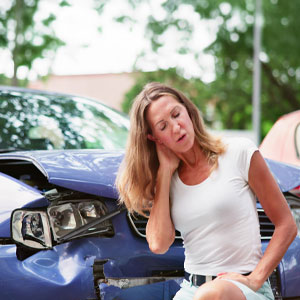 Common Injuries
Common InjuriesCars have become significantly safer over the years, with advanced safety features like multiple airbags, blind spot readers, and automatic braking systems. These advancements have contributed to reducing the severity of injuries in many accidents. Despite this, car accidents still result in various types of injuries, and some are more common than others.
This is one of the most common injuries from car accidents, especially rear-end collisions. It occurs when the head is suddenly jerked backward and then forward, causing strain on the neck muscles and ligaments.
More severe impacts can cause the discs in the spine to herniate or rupture, leading to significant pain and potentially requiring surgery.
In high-impact collisions, the vertebrae can fracture, leading to severe complications and requiring extensive medical treatment.
These are common and often affect the neck and back. They can cause pain, swelling, and reduced mobility.
Bruising from the impact can occur anywhere on the body but is especially common in the torso and limbs.
The sudden impact can cause the brain to move within the skull, leading to a concussion. Symptoms might include headaches, dizziness, and confusion.
In more severe cases, TBIs can occur, potentially resulting in long-term cognitive and physical impairments.
The force of a collision can cause the ribs to fracture, especially if the chest hits the steering wheel or is restrained by a seatbelt.
Damage to internal organs such as the lungs or heart can occur, particularly in high-speed collisions.
Remember to seek medical attention promptly, even if you seem to feel fine. There’s a chance the injury you’ve suffered may not immediately present symptoms.
Whether to call the police after a minor accident can depend on several factors. While you may not always need to call the police for minor accidents, it’s better to err on the side of caution. If there’s any doubt about the accident details, concerns about safety, or if anyone requires medical attention, calling the police is generally the right course of action. Doing so helps ensure the incident is properly documented and can prevent complications with insurance claims later on. Here’s a brief overview to help you determine when it’s necessary to involve law enforcement:
If the accident is minor and both vehicles are drivable, the police may simply ask you to exchange information and move your vehicles out of the roadway. In such cases, you can often handle the situation between the involved parties and let your insurance companies deal with the claims.
Even in minor accidents, it’s important to document the scene. Take photos of the vehicles’ positions, the damage, and the accident location before moving the cars if it’s safe to do so. This evidence can be vital when filing insurance claims.
If there’s any uncertainty about how the accident occurred or if you’re worried about how the details will be communicated to insurance companies, it’s wise to call the police. A police report can provide an impartial account of the incident.
If you feel unsafe or uneasy about the other driver, or if the other driver flees the scene, you should definitely call the police.
If anyone is injured or you suspect there might be injuries, calling the police and emergency medical services is a must.
Police will respond to a 911 call, though they might not always be sympathetic, especially to minor incidents. Their primary role is to ensure safety and document the incident accurately. If the accident is minor and both parties agree, you can exchange information such as names, contact details, insurance information, and vehicle registration. Make sure to document this exchange thoroughly.
Even if you call the police, always take photos of the accident scene before moving your vehicle. This documentation is vital for insurance claims and any potential disputes. If it’s safe, move the vehicles to the side of the road to avoid obstructing traffic and to ensure everyone’s safety.

Monty Yolles, a distinguished attorney at The Yolles Legal Group in Maryland, has a proven track record in personal injury law, particularly with car accident cases. With years of experience helping clients navigate the aftermath of car accidents, Monty understands the complexities of dealing with injuries, insurance companies, and legal claims. His knowledge and experience mean you’ll receive the support and advocacy you need to recover and move forward.
Ready to get the help you need? Contact The Yolles Legal Group today to schedule an initial consultation.
Interacting with insurance companies requires considerable caution to protect your interests. Always consult with an attorney before making statements to the other driver’s insurance company, and consider allowing your attorney to manage any injury claims you have to avoid unnecessary complications. For property damage, direct communication is usually more practical, though you can seek assistance if you need it. Here are some more things to consider:
Most insurance policies require you to cooperate with your own insurance company after being involved in an accident. Part of this requirement includes providing it with a statement about the accident. While they often prefer an oral statement, you can opt to give a written statement if you’re more comfortable with that.
Your insurance company needs your version of events documented early on, especially if they pay out a claim and seek reimbursement from the other driver’s insurance. Having your story on record helps support their case.
If you’re considering hiring an attorney, consult them before speaking to the other driver’s insurance company. This ensures you don’t inadvertently say something that will most likely be intentionally misconstrued or harm your claim.
Be cautious with your words. Even a simple apology like I’m sorry could be misinterpreted as admitting fault. An attorney can guide you on what to say and what not to say.
For property damage claims such as car repairs, it’s likely more efficient to communicate directly with the property damage adjuster from the insurance company. This helps expedite the process. On the other hand, it’s wise to let your attorney handle communications with the insurance company for bodily injury claims. This helps mitigate damages and avoid potential mistakes that could weaken your claim.
Immediately documenting the scene of your accident is vital for creating a strong case. Taking this proactive step can make a significant difference in the outcome, whether you end up settling through negotiations with the insurance company or presenting your case in court before a judge or jury. The information you gather right after the accident preserves what actually happened, strengthening your position and helping to ensure a fair resolution.
Over time, evidence can be lost or altered. Traffic cameras might record over footage, memories can fade, and physical evidence can be removed without any ill will. Immediately after an accident, people might clearly remember what happened, but this can—and often does—change over time, whether intentionally or not. In fact, many people change their stories shortly after speaking with their insurance companies or due to their own defense mechanisms. Others may unintentionally modify their recollection to protect themselves psychologically, telling themselves they couldn’t have made a mistake because they’re a good person.
Promptly documenting the scene ensures this information is preserved. Photos and other recorded details serve as objective proof that can be presented to a jury. Taking photographs of the scene helps capture the exact location and position of the vehicles involved, which is critical in determining how the accident occurred and the extent of the damage. These details help create an accurate narrative of the accident, which is essential when explaining the incident to insurance companies or in court.
Look around the accident scene for any surveillance cameras that might have captured the incident. Many businesses and traffic lights have cameras that could provide valuable footage.
Increasingly, drivers use dash cams that continuously record while they drive. If any witnesses have dash cams, their footage could be extremely useful.
For more information on Personal Injury Claims For Car Accidents, an initial consultation is your next best step. Get the information and legal answers you are seeking by calling (301) 670-0443 today.

Monty Yolles, a distinguished attorney at The Yolles Legal Group in Maryland, has a proven track record in personal injury law, particularly with car accident cases. With years of experience helping clients navigate the aftermath of car accidents, Monty understands the complexities of dealing with injuries, insurance companies, and legal claims. His knowledge and experience mean you’ll receive the support and advocacy you need to recover and move forward.
Ready to get the help you need? Contact The Yolles Legal Group today to schedule an initial consultation.